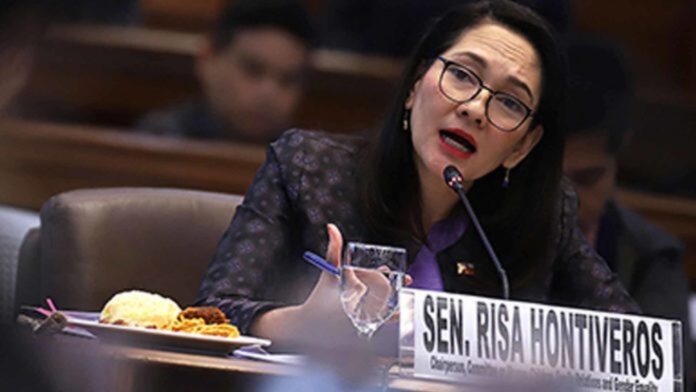Senator Risa Hontiveros today pushed for the creation of a comprehensive national action plan for public health security and emergencies, and a multi-sectoral body that will better coordinate government’s response to a health crisis like the COVID-19 pandemic.
Hontiveros, author of Senate Bill No. 1801, otherwise known as the proposed Philippine Public Health Security and Emergency Act of 2020,” said that the country’s experiences in its fight against the COVID-19 pandemic have revealed the need for a national policy framework for health emergencies, and a health-sector led inter-agency body that will ensure the effective implementation of such a plan.
“The pandemic has taught us painful lessons about the country’s preparedness and readiness in responding to health emergencies. Maraming buhay at kabuhayan ang nawala dahilan sa hindi malinaw na sistema at hindi epektibong polisiya. Moving forward, government must have better public health security plans and mechanisms in place that are continuously updated to reflect past lessons and best practices,” she said.
The proposed measure, Hontiveros said, will mandate the establishment of the Philippine National Plan for Public Health Security and Emergency (PNAPHSE), a framework which will review government’s capacity to respond to health emergencies and comply with international health regulations, identify risks, and create a multi-hazard emergency response plan which will guide national and local government units in responding to various health emergencies like outbreaks of infectious diseases, chemical events, or even biological attacks.
To carry out this plan during a health crisis, Hontiveros said, the bill will also require the creation of a Philippine National Public Health Security and Emergency Council (PNHSEC), a multi-sectoral and health sector-led body that will direct, oversee and coordinate the implementation of the said national plan.
Under the bill, among the responsibilities of the PNHSEC is the authority to recommend to the President the declaration of a public health security and emergency, and the provision to the public of daily news updates or health bulletins during a period of public health emergency.
The PNHSEC, which will be chaired by the Secretary of Health, will be composed of not just Cabinet officials and lawmakers, but also representatives from provincial, city, municipality and barangay government units, civil society organizations, medical societies and associations, and the private sector, Hontiveros noted.
“The idea is to adopt a whole-of-government and whole-of-society approach to public health emergency response so everyone – national officials, local leaders, non-government organizations and other stakeholders – will have a bigger role in crafting and coordinating our response to any health situation,” she said.
“Dapat hindi na maulit ang naging pagkakamali ng bansa nitong mga nakaraang buwan pagdating sa paglaban sa pandemiya. We have to learn from our mistakes and move towards necessary reforms so that we can save more lives and prevent social and economic disruption during any health emergency,” she concluded.


